Iran Says Its Diplomats To The OIC Arrived In Saudi Arabia
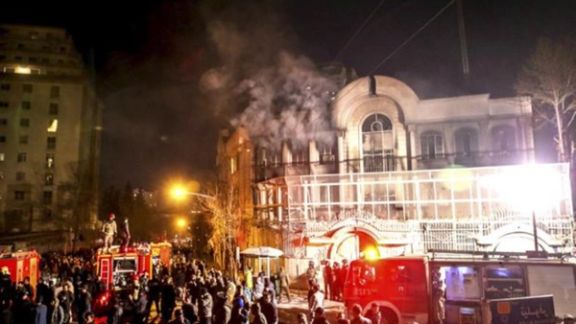
Iran confirmed Monday that three of its diplomats have arrived in Saudi Arabia to represent Tehran in the Organization of Islamic Cooperation.

Iran confirmed Monday that three of its diplomats have arrived in Saudi Arabia to represent Tehran in the Organization of Islamic Cooperation.
A report by state media said the diplomats arrived several days ago, marking the first time that Saudi Arabia is receiving diplomats from Iran since 2016, when Riyadh severed relations with Tehran after Iranian hardliners attacked and ransacked its diplomatic missions in Iran.
Iran has taken the development as a positive sign for improving ties and a possible exchange of diplomats. Jeddah is the permanent venue of the 57-member organization.
Iran's Foreign Ministry spokesman Saeed Khatibzadeh said that Iran is focusing for now on reopening its offices in OIC with three diplomats. Iran has long said it's ready to reopen its embassy in Riyadh.
In recent months, neighboring Iraq has hosted talks between the two countries aimed at normalizing ties. Although Tehran in recent days has been claiming that new talks will take place, Riyadh has been silent on the issue, saying previous talks in 2021 remained explaratory.
Saudi Arabia is also concerned about Iran's nuclear and ballistic missiles programs. Iran says the nuclear program has peaceful purposes and its missile program is merely defensive.

Former President Donald Trump says Iran, China, and Russia don’t take the United States seriously anymore under the presidency of Joe Biden.
Trump, who was speaking among his supporters in Florence, Arizona on Saturday, denounced Biden’s foreign policy that has emboldened other countries not to respect the US.
He said during his tenure there was no problem with Russian President Vladimir Putin regarding Ukraine, no problem with China’s President Xi Jinping on Taiwan, adding, “China, Russia, and Iran are engaging in aggression and provocations they never would have dared to just one year ago”.
“They are toying with us”, Trump stated.
Last week, Former Secretary of State Mike Pompeo also slammed the Biden Administration for continuing talks with Iran while Tehran is threatening former US officials and attacking US targets.
He was referring to an animation video published on the official website of Iran’s Supreme Leader Ali Khamenei showing a man targeting Trump playing golf.
Following the publication of the video, Twitter permanently suspended one of Khamenei’s accounts apparently for sharing the animation.
Khamenei and other top civilian and military leaders have threatened revenge for the killing of Qasem Soleimani, the Iranian operator who organized and controlled anti-Western and anti-Israeli militant groups in the Middle East. Trump ordered his killing in early 2020. He was one of Khamenei’s most trusted people.
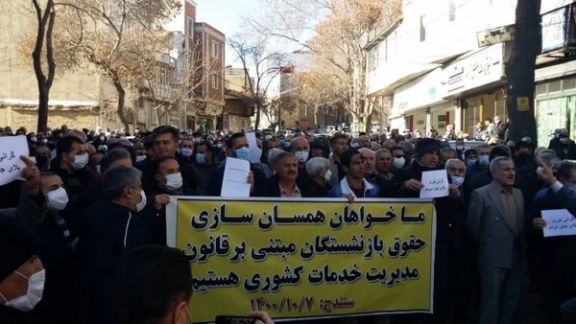
Iran needs $400 billion in investments if it is to save itself and its exhausted, oil-dependent economy in the next few years, an economist in Tehran has said.
In the past 50 years Iran has sold two trillion dollars of oil with little economic growth to show for it, Vahid Shaghaghi Shahri, professor of economics at Iran’s Kharazmi University told Khabar Online websiteon Sunday.
Asked if negotiation to revive Iran’s 2015 nuclear deal succeed in Vienna and United States’ sanctions are lifted will save the economy, Shahri responded that Iran faces plenty of international restrictions and impediments, but what is equally important is the quality of its internal governance.
Shahri also mentioned multiple crises in the history of the Islamic Republic as a factor in preventing a decent rate of economic growth. But in fact, except the first few years of the Iran-Iraq war in the early 1980s, every crisis was a choice made by the leaders of the regime.
Shahri, living in Iran, could not openly make such a comment, but in fact, the decision to create and maintain a state-controlled economy unfriendly to foreign investments, lack of social and political freedoms, unfair advantage to regime insiders, especially the Revolutionary Guard are some of the self-inflicted wounds.
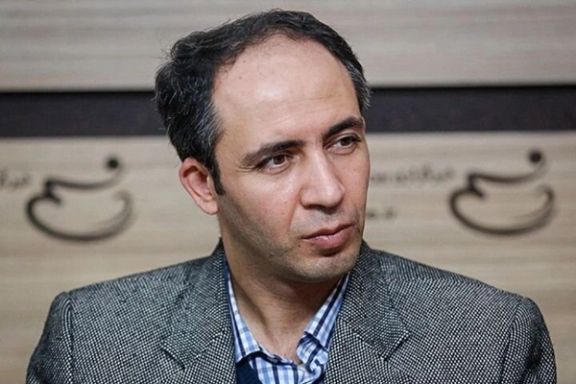
Shahri in the interview referred to two rounds of international and US sanctions in 2010s and said called it a “lost decade”. From 2010 to 2020 the average rate of economic growth was zero, he said and added, “What is important is that after a decade of economic crisis Iran needs to take special action to save the economy from exhaustion and decline.”
The country needs $400 billion in investments in the current decade, Shahri argued, $130 billion only to maintain its fossil fuels production.
The amount needed to revitalize Iran’s oil and natural gas sector mentioned by Shahri is indeed less than what oil minister Javad Owji mentioned in November. He told a budget planning meeting that Iran needed to invest $160 billion in its oil and gas sector or face declining output and eventually imports of fuels.
Shahri also pointed out that for the first time in Iran’s modern history, infrastructure depreciation has surpassed the rate of investments. Insisting that this is a serious crisis, he said that while oil prices are at a recent high of $80 pb, Iran has failed to resolve the nuclear issue and lift sanctions, losing precious time.
Shahri voiced concern that in US Congressional elections in November the Republicans will make gains and will start “to do naughty things” against Iran, so it is better to make a deal on the nuclear issue now. The Islamic Republic also needs to resolve the FATF issue, he urged.
The Financial Action Task Force or FATF, an intergovernmental watchdog, has put Iran on its blacklist for failing to adhere to international conventions against money laundering and financing of terrorism.
Shahri warned that even if Iran resolves it nuclear dispute with the West, “We will face three tough years ahead,” as government coffers are empty and there is a crisis to pay pensions to millions of retired government workers. Moreover, the age of high global dependence on oil is coming to an end and Iran can face a situation of surviving without its main revenue source.
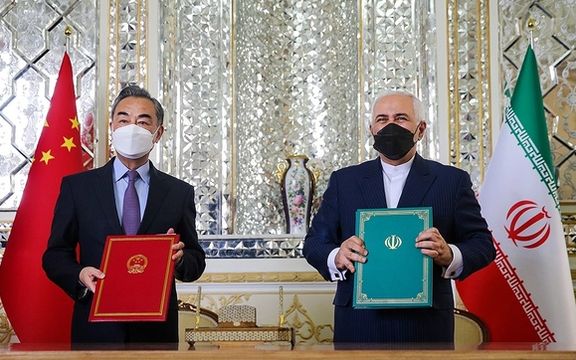
Many Iranian have been expressing resentment over a 25-year cooperation agreement with China and a proposed 20-year deal with Russia, saying it is a sell-out.
Although Iran has not revealed the details of the agreement with China and what it will entail in political, economic and military terms, some social media users go as far as claiming that the Islamic Republic is "selling out the country and its people" to China and Russia.
Not only politicians and the reformist media, but also many ordinary Iranians are wary of the consequences of too much reliance on the two powers, without simultaneously improving relations with the West to create a balance.
Others are wary of Russia's proactive role in the ongoing nuclear talks in Vienna and insist that Iran should directly negotiate with the US instead of allowing the interference of mediators like Russia.
"It is true that striking a deal with China is not a problem, but such agreements should not be limited to China and Russia. There should be long-term agreements with China and Russia as well as the United States and Europe to create a balance in foreign relations and reap the political and economic benefits of such balance for the nation," one Twitterati opined Sunday.
A man holding a sign in Iran that says, "Iran not for sale - China, Russia get lost".
Many also say they do not believe that China and Russia can be considered as Iran's strategic allies and partners. As permanent members of the UN Security Council, Russia and China did not block punitive UN sanctions resolutions over Iran's nuclear program a decade ago. "A sanctioned Iran is a gold mine for them," another Twitterati wroteSunday.
Some ordinary Iranians who are opposed to long-term deals with the two Eastern powers have been posting photos of themselves with posters expressing their disapproval. Some have taken their photos in front of government buildings and other landmark buildings to prove that they are posting from inside Iran, not from foreign countries as officials often claim, to discredit domestic critics.
Hardliners claim that closer economic and political relations with the East and Asian countries, which Iran's Supreme Leader Ali Khamenei has promulgated with the catchphrase "Looking East", will help Iran's development and strengthen it against Western powers, particularly the United States. Since 2018, and Khamenei's advocation of the policy, "Looking East" has become one of the centerpieces of a 'revolutionary economy' which hardliners have been hard at work to theorize.
Although Iranian officials for months said a 20-year strategic agreement with Russia had entered the final stages of drafting and even been almost finalized, the spokesman of the parliament's National Security and Foreign Policy Committee said Sunday that signing an agreement will not be on the agenda of President Ebrahim Raisi's visit to Moscow this month.Such an agreement requires further investigation and preparations, Mahmoud Abbaszadeh-Meshkini told Fars news agency, and added that the two sides will discuss the preliminaries of the agreement during the visit.
The Russian side has not shown any enthusiasm about the deal sought by Iran's hardliners although the two countries had a 20-year agreement which expired.
According to an opinion survey by Gamaan polling agency in the Netherlands with a sample population of over 20,000 Iranians living inside Iran that was published October 27, 65 percent of respondents had a negative view of China and Russia. In the same survey 40 percent said they viewed the United States negatively.
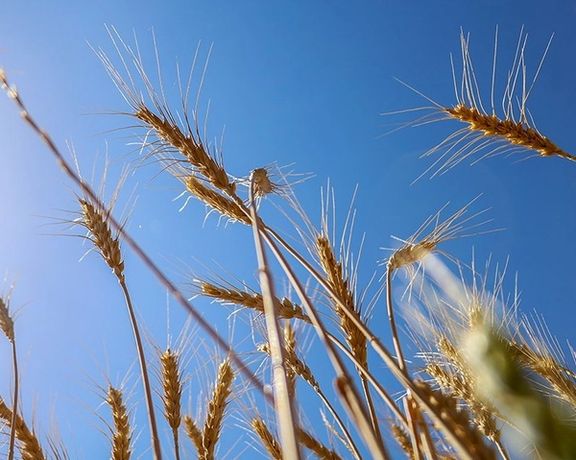
Iran's health ministry has issued a license for human consumption of contaminated wheat from Russia, despite tests that showed high levels of lead.
Head of Iran’s Food Industries Associations Mohammad Reza Mortazavi said on Sunday that the health ministry has determined that the amount of lead in the wheat is “standard and natural”.
He noted a health ministry letter that was sent last week had warned the wheats were contaminated with a hazardous amount of lead but now the ministry has approved the necessary licenses for human consumption based on results of new tests.
Mojgan Pourmoghim, the head of the Food and Drug Administration's quality control laboratory, had earlier confirmed the contamination, saying, "The clearance permit for the wheat shipments is temporary and it is issued only because the country's wheat silos are empty”.
These contaminated wheats have not yet entered the consumption cycle, she added.
Gholamhossein Shafei, the chairman of Iran’s Chamber of Commerce, had warned of the shortage of wheat in March last year due to the severe drought that hit domestic production.
According to an October report by Reuters, Iran needed to buy a record 8 million tons of wheat in the current season to be able to provide its population with bread that is an important food staple in the country.

One day after residents heard a series of loud explosions in Western Iran, authorities continue to offer contradictory explanations, with no clear conclusion.
The explosions were heard in many cities across the provinces of Kermanshah, Hamedan and Kordestan Saturday night, causing numerous speculations and rumors by residents of the region as well as officials.
Soon after the blasts, Saeed Ketabi, the governor of Asadabad city in the Hamadan province – which is reportedly the epicenter of the explosions -- confirmed that a loud noise was heard and rejected earlier reports about the noise coming from thunders and storms.
At the same time some sources claimed that the sounds were part of an air defense exercise by the Islamic Republic's Armed Forces and some reports quoted Iran's Revolutionary Guard as saying that they launched air defense drills in the region.
Social media reports said that there was anti-aircraft activities with some twitter users saying an anti-aircraft missile was fired and then there was one explosion near or at a military base.
However, Khatam al-Anbia Air Defense Base rejected the news, stating that no military training, exercise, or operations took place in the country Saturday night.
Iran's aviation authorities added to the mystery by confirming that flights were cancelled in Western Iran at the time the explosions were heard, but say it was just because of weather conditions, not any explosion.
After a series of contradictory and failed explanations, the authorities are apparently back to the older version they had put forward, to give off a vibe of being in control. Officials from the interior ministry said on Sunday that the loud sounds heard in several western cities were the result of lightning.
Some unnamed “informed source” is quoted by Tasnim – a news agency with links to IRGC – that the sounds were actually “thunder and lightning”, as if the inhabitants of the Zagros Mountains region are new to the phenomenon.
The source also denied reports attributing the sounds to acts of sabotage or foreign attack. Similar sounds of explosion were heard in early December around Natanz nuclear facility in central Iran, which officials said came from military drills.
Earlier this month, the sound of aloud explosion was heard in a town near Tehran, prompting IRGC to announce it as the result of a “controlled rocket launch”.
Tensions are high in the region amid Iran’s nuclear talks with world powers. Israel has repeatedly said it will not tolerate Iran reaching a nuclear breakout point, while Tehran has threatened severe retaliation in case of any attack.
Iran has held several military exercises in recent months.
After the downing of the Ukrainian flight PS752 with two missiles in January 2020, the Iranian government and the IRGC tried to hide the true cause for three days, and only came forth to admit the tragic incident was not an ordinary plane crash, after amateur video footage emerged showing the plane exploding.